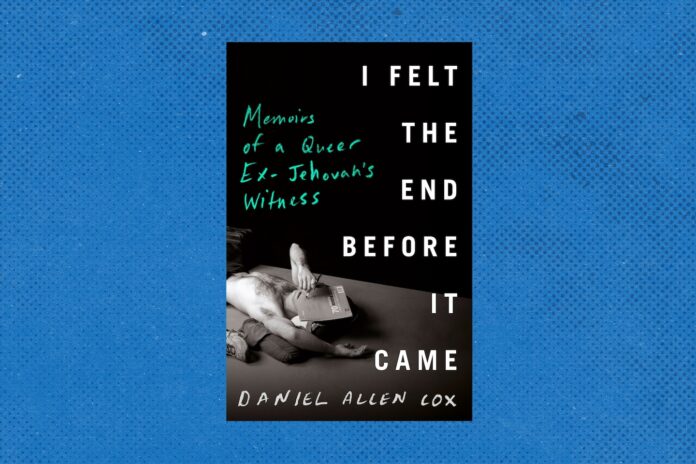The witness’s second priority: to share this evangelical interpretation of Armageddon and its aftermath with others. It’s this missionary service that has made the sect famous, its adherents the butt of bad jokes. Every day, signs of devilish deviance remind adherents of the faith — including Cox’s mother and grandparents — who really rules this world. To them, the devil’s hand can be seen in everything from banal songs to a clock falling off the wall in a vacation home (where demons lurk).
Apocalypse, according to this theology, is external, with catastrophe happening all around you. For some who grow up in the faith, such as Cox, however, the true cataclysm occurs internally. Tracing the traumas of his upbringing throughout this memoir-in-essays, Cox reveals his attempts at establishing an adult life in his personal Armageddon’s aftermath. Organized more thematically than chronologically, the essays share tales of near misses with Michael Jackson, perhaps the world’s most famous former Jehovah’s Witness, and encounters with David LaChapelle alongside an intensive consideration of a spell spent in post-communist Poland teaching English as a foreign language.
Forced to regularly confront the “living paradox” that is being a Jehovah’s Witness today — a how to be in this world but not of this world — Cox may have been more questioning of the faith than most. His own personal reckoning came when he realized that he might be gay while practicing a religion that is strictly against homosexuality and while the AIDS crisis was hitting its peak. “Being gay could kill me before Armageddon came — unless this was the proof that it was already here,” he writes.
Outed to an elder even before he was firm in his identity, the teenager who had followed the religion’s anti-education edicts and who had few friends outside the Kingdom Hall, was allowed to choose his preferred means of excommunication: disfellowship or disassociation.
“Disfellowshipping is a form of JW discipline reserved for serious transgressions of the rules, often of a sexual nature,” Cox writes, noting that these rules are based on elders’ interpretations and subject to change. By choosing this form of shunning, members can be reinstated after just a year.
Disassociation, on the other hand, requires actively disavowing yourself of the religion. In doing so, you become persona non grata, shunned by fellow witnesses, even family members. He chose the latter option, writing, as he says, “a breakup letter to Jehovah, the first proof I’ve ever had that I could think for myself.”
When he became an apostate, the door to the overtly religious chapter of his life closed and nearly everyone he knew turned their backs on him. “Shunning an apostate is a way for active members to confirm their choice to remain. It allows the community the option of punishing a single member rather than becoming self-aware,” Cox writes. It also opened him up to a world of grief and anger that he was left alone to grapple with. “Vulnerable people are separated from their communities at the exact time they need them.”
A different definition of “disassociation,” which derives from trauma psychology, also feels fitting to describe what Cox experienced after the shunning. Fully embracing his queerness as a young adult, he searched for safe homes in gay nightclubs and bars, first in Montreal and later New York. Sloughing off the pain of a childhood that he found troublingly hierarchical, he would, he explains, find solace and salvation in writing and in music while mourning his past and literally burying several of his friends. “If some degree of Witness-think is a chronic condition in me — and I believe that to be the case — maybe I need music in my life forever as a buffer between me and the thinking I can’t expel.”
This is ultimately a story about the struggle to build a life out of ashes with little to no support — about unlearning familial inheritances and forgiving ourselves for our own trespasses. Most of all, it is about learning how to carry on after leaving a community obsessed with finality. Though he had no idea what awaited him upon his departure from the Jehovah’s Witnesses, Cox writes neatly about what he had to undertake. “I would embark on a lifetime project to redefine words that had once been used against me,” he writes. “The point is that one cannot imagine escape, or agency, or the true shape of one’s life until there is a language for it.”
“I Felt the End Before It Came” is Cox’s way of putting his chaotic life experiences into words. In so doing, he has offered up a language for others who might still be searching for the right thing to say.
Courtney Tenz writes about European arts, culture and travel for her newsletter, the Intangibles.
I Felt the End Before It Came
Memoirs of a Queer Ex-Jehovah’s Witness
A note to our readers
We are a participant in the Amazon Services LLC Associates Program,
an affiliate advertising program designed to provide a means for us to earn fees by linking
to Amazon.com and affiliated sites.



